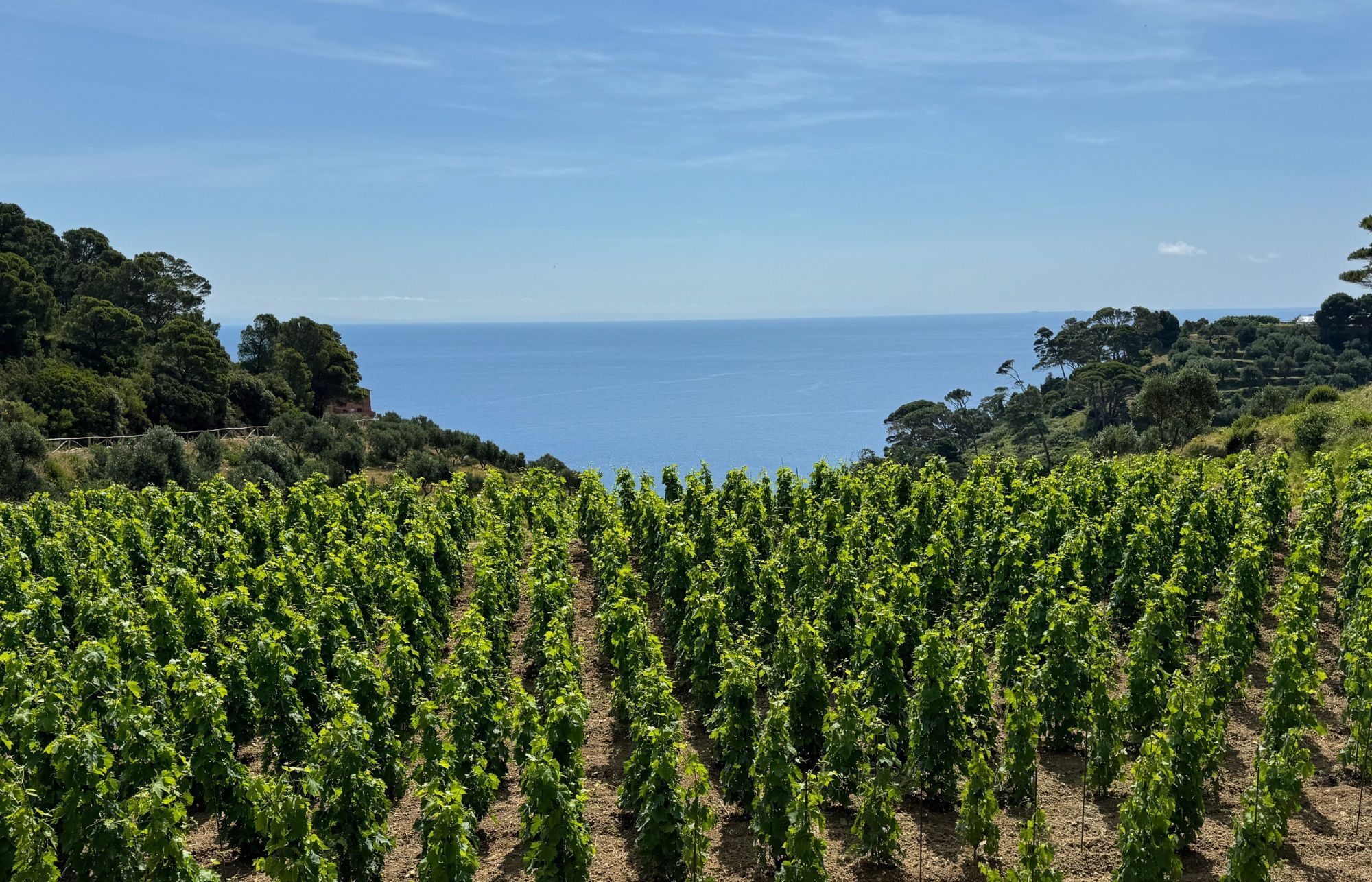When the Frescobaldi family invites you out to Florence for a few days, you don’t say no. One of the most famous names in Tuscany, let alone Tuscan wine, the chance to visit the city and surroundings with one of the founding families of the famed Florentine Republic was something the history tragic in me was bubbling with excitement to experience.
Visiting the family’s own palazzi and piazze, spending time in their beautiful vineyards and tasting through the impressive portfolio of wines, it was all a blur of sensory delight. But all that was markedly eclipsed by one of the most special and thought-provoking days I’ve had in many a year.
On the final day of the trip, we visited the prison island of Gorgona. A handful of journalists from across the globe, and what felt like the entire Frescobaldi family, boarded the boat at Livorno for the 90-minute journey into the Mediterranean to discover more about a fascinating social project run by the Italian State and now keenly supported by the Frescobaldi family.
But just how had the family become attached to the project in the first place? What was the buy-in from the inmates? And as admirable as the project is, could the wines stand out all on their own?
The history of Gorgona
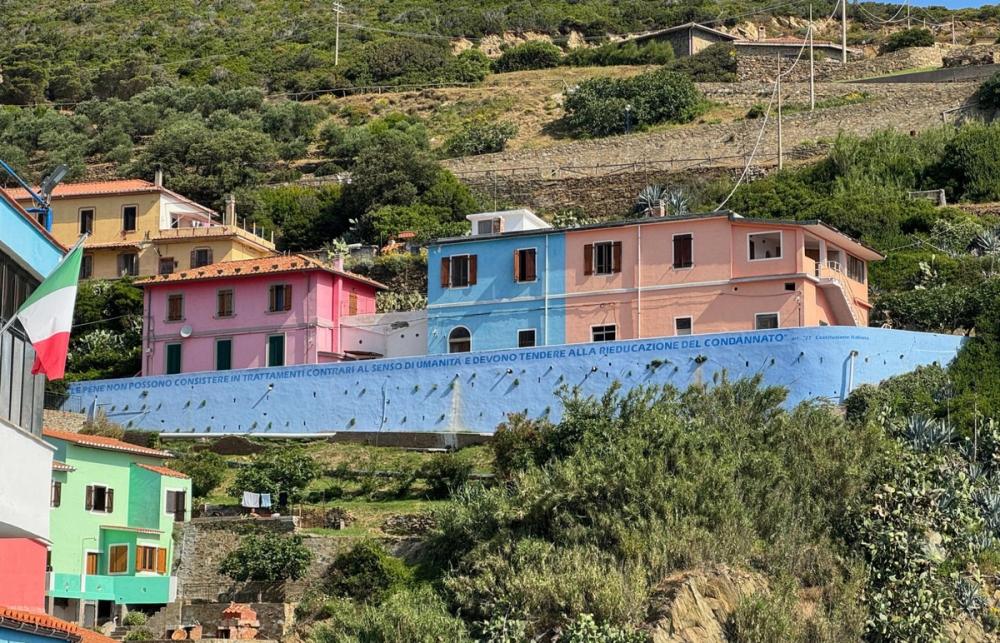
Arriving on the island to a clear message of rehabilitation
The Gorgona prison Island is one of the last remaining island prisons in Italy. Previously home to a remote monastery, the island was established as a correctional facility way back in 1869. It continues to serve, in accordance with the initial purpose, as an open-air correctional facility where inmates engage in agricultural activities, such as farming and animal husbandry, as part of their rehabilitation.
The inmates chosen to live on the island have the chance to learn new skills and work in a less restrictive environment compared to traditional prisons. Gorgona's approach to rehabilitation through nature and work has gained international attention as a model for progressive correctional practices.
The island itself is part of the Tuscan Archipelago National Park, north of the more famous island of Elba for all you Napoleon fans out there! It’s known for its rich biodiversity and scenic beauty which has seen it established as a protected natural reserve. Visiting, however, is tricky. Due to its status as a prison, access to the island is highly restricted, with the trip I was allowed to attend being the only time each year Frescobaldi is allowed to bring out such a group.
The wine project on Gorgona
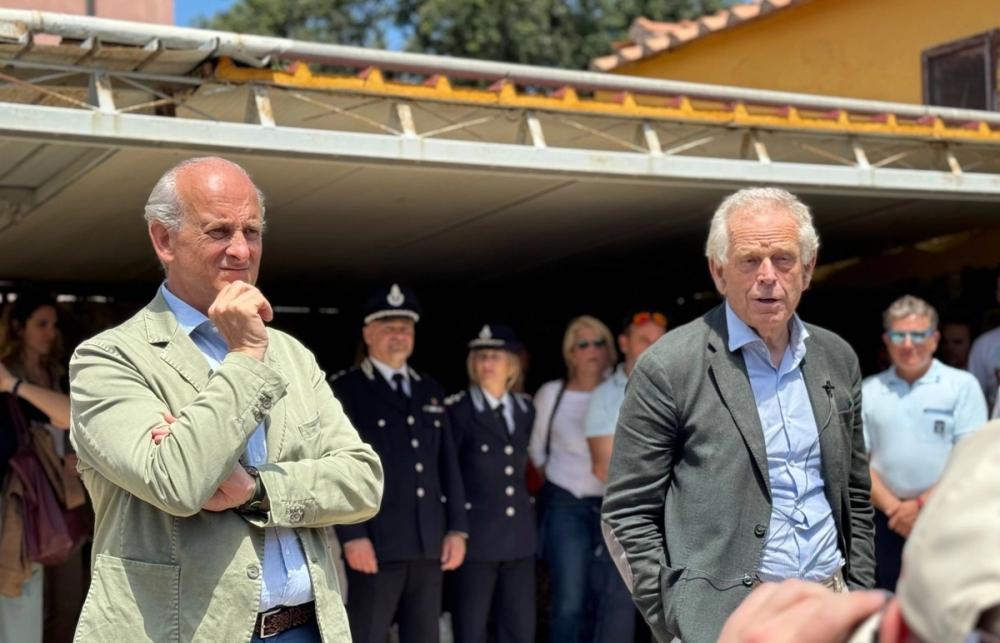
Marchese Frescobaldi and Nicolo D'Afflitto (l-r)
Wine had been made on Gorgona before the Frescobaldi became involved. Vineyards were established in 1999, but after just over a decade the head of the project on the island realised they needed help to produce wines of the quality they thought possible. In 2012 they sent out emails and made calls to the great and the good of the Tuscan wine industry.
“They told me that they had reached out to around 400 Tuscan wine producers and we were the only ones to reply,” joked president of Frescobaldi wines and the current Marchese, Lamberto Frescobaldi.
“Of course, in the years following I’ve had plenty of friends tell me that they were also going to offer to help. I’m not sure I believe them all!”
Later that year, in August 2012, the Frescobaldi for Social Responsibility initiative was launched. Working closely with the management of the Gorgona institution, the Marchese and his team developed a programme to provide inmates with practical experience of grape cultivation and winemaking. This takes place under the supervision of Frescobaldi’s agronomists and oenologists that boat in from the mainland throughout the growing season. It's not always practical, with the 2020 harvest having to be delayed due to rough seas, but it’s a small price to pay for the opportunity.
Lamberto Frescobaldi’s contact list is fairly impressive, and he could call on friends to help promote the project. Andrea Bocelli signed the first vintage in 2013, whose first magnum was presented to Giorgio Napolitano, the then President of Italy.
The fabulous labels were designed by celebrated graphic artist Simonetta Doni, whose idea to have the outer labels as an almost blank sheet reflects the nature of rehabilitation the island strives to achieve. Giorgio Pinchiorri, owner of the three-Michelin-starred Enoteca Pinchiorri in Florence, promotes both the food and wine of the island at one of Italy’s most acclaimed restaurants.
The vineyard on Gorgona
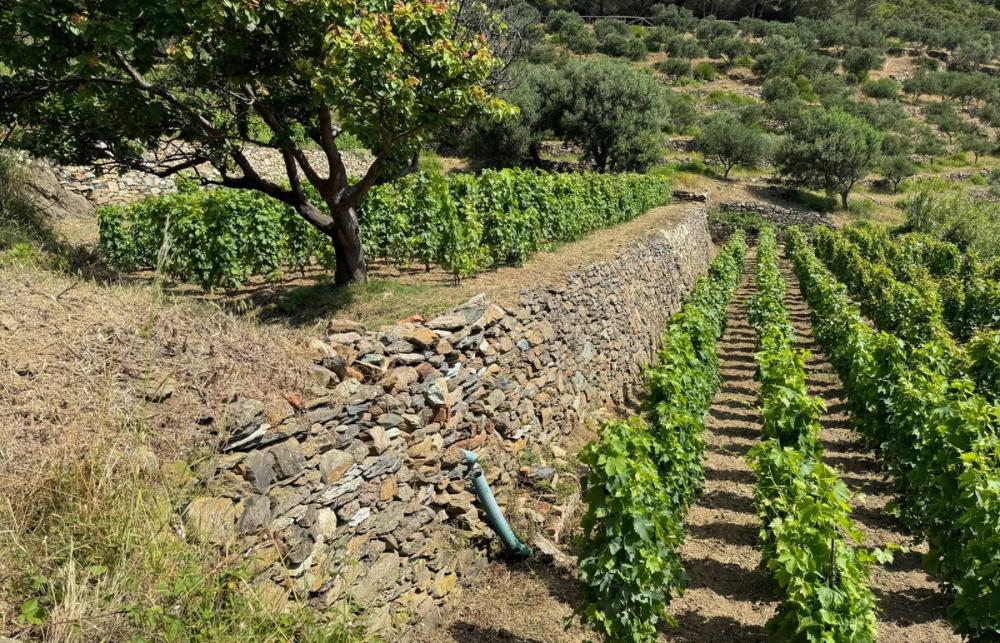
Stone terraced vineyards
I didn’t really know what to expect from the vineyard itself. We were briefed that it was started in 1999 and there had been small additional plantings in 2015 and 2017 to allow for more inmates to become involved. I’d also, by this point, tried the Gorgona Rosso (more on that later) and knew it had some game. But when I saw the situation of the vineyards, well… it became clear why this project made so much sense to Lamberto Frescobaldi and Nicolò D’Afflitto, the director of winemaking for the Frescobaldi group. If I was try and draw the perfect vineyard, I’d be hard pushed to beat the site on Gorgona.
Planted 50-100m above sea level, although less than a kilometre from the bay, the sloped vineyard sits in an east-facing amphitheatre that protects it from the worst of the sea winds. The total plantings are a nudge under just two and a half hectares on rocky, stony volcanic soils. It follows the ethos of the rest of the island in bringing the inmates closer to nature, using only organic farming methods.
I spoke to D’Afflitto in the vineyards of Gorgona about his memories of the project’s beginnings in 2012.
“I remember the Marchese ringing me when I was on holiday,” reflected D’Afflitto. “He said we only had a couple of weeks to say yes or no as harvest was approaching, so I took the next boat out. The vineyard was so beautiful, I knew we could do something wonderful here.”
His team set about rejuvenating the vines, using gobelet head training to make the most of the winds and exceptional sunshine, as well as teaching the inmates how to rebuild and maintain the stone terraces overlooking the shoreline.
The Gorgona inmates
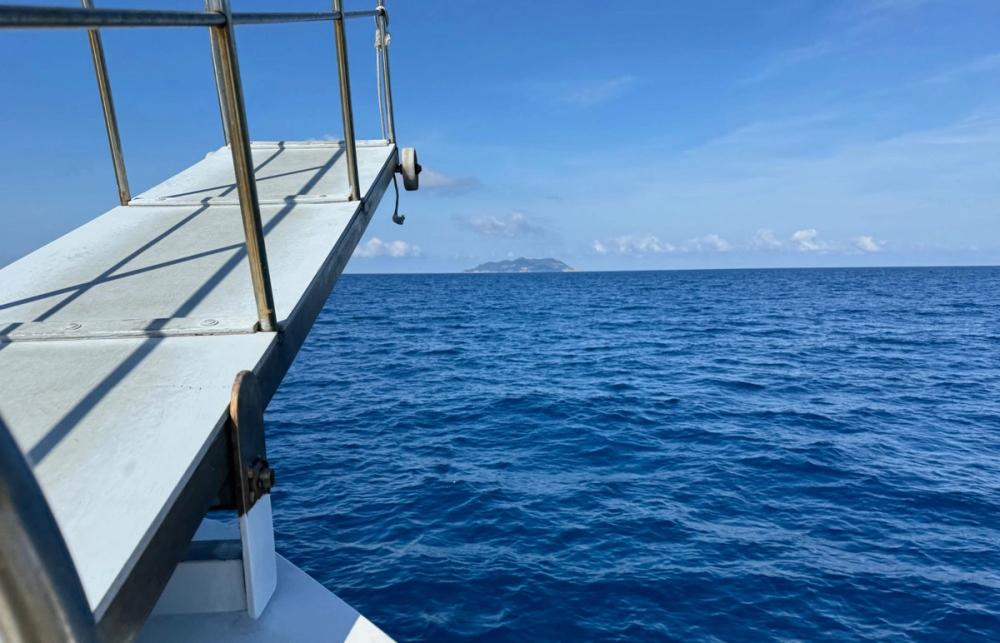
Heading to the remote island of Gorgona
The inmates who live and work on Gorgona are selected from across the prisons on the mainland. They have to have a minimum of a 25-year sentence, but if they show consistently good behaviour, they can apply to be transferred to Gorgona. There are currently around 65 inmates working on the island, with five selected to work on the wine project.
Alongside the inmates are the prison guards, who have also bought into the project.
“We have to offer great thanks to the prison staff for asking us to come in and letting us run this winery,” noted Frescobaldi. “They’ve not asked us to leave yet!”
This harmonious relationship between wine company and correctional institute is based upon the Frescobaldi team knowing and respecting the rules from day one.
“Winemaking has its challenges for the inmates as they’re not allowed to drink, so can’t taste the wines themselves,” admitted Frescobaldi. They also rarely get to see the finished product, as the barrels are shipped by boat back to the mainland for ageing and subsequent bottling.
Every month Gorgona receives another 30 applications from the 75,000 prisoners in Italy, such is the success of the island’s story. The re-offending rate for prisoners who have spent time on Gorgona is less than 1% over the last 150 years.
Inmates who join the wine project have an extra incentive. From 2014 onwards, Lamberto Frescobaldi insisted that the inmates who work on the wine were hired directly by the winery.
“I had an epiphany at the start of our involvement,” revealed Frescobaldi. “I wanted to hire an inmate who was to be released and asked the prison officer what they had done. I was told that it didn’t matter, he had already been judged and served his time, I didn’t get to judge him for a second time. It made me want to make sure there was a future for these men.”
Inmates earn a wage, having some money for when they’re released, and usually find a job in the wine industry in Tuscany thanks to the connections of the Frescobaldi family.
The wines of Gorgona
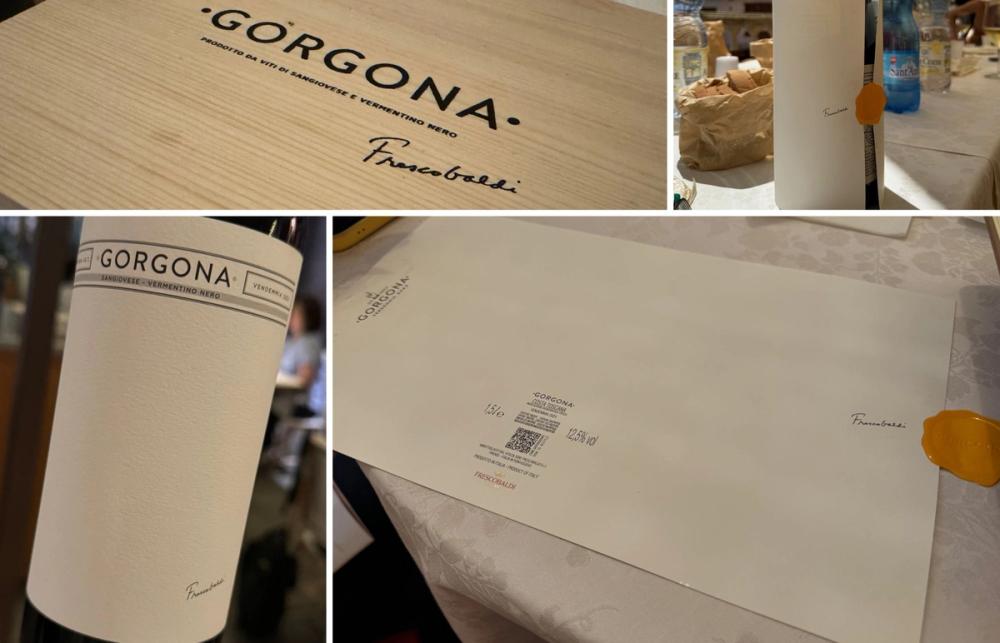
The minimal design of the wines of Gorgona
Gorgona Bianco, Costa Toscana IGT, 2023
UK RRP £95
Produced from a blend of Vermentino and Ansonica (aka Inzolia) harvested at the end of September and into October. The wine was matured for 7 months in a combination of stainless steel and oak barriques.
When poured into the glass, the first thing that hits you is the striking, shimmering almost golden colour. On the nose you get a sea-facing saltiness with complex herbal notes from the island's unique shrubland including rosemary, fennel, almond and chamomile floral aromas. The fruits range from citrus to stone and to tropical. When you taste it, you realise just how much is going on in the glass, but it’s all brought together beautifully with the persistent acidity and saline notes that allow you to love the expressive, complex notes, but still be more than ready for a second glass. This is a high-quality wine.
Gorgona Rosso, Costa Toscana IGT, 2021
UK RRP £180
We tried the rosso a couple of nights before we visited the island, at Ristorante Frescobaldi in Florence’s Piazza della Signoria. I say that to point out that I didn’t have the full story behind the wine. I was just trying it as a wine, pure and simple. And it was delicious. Made from a blend of Sangiovese and Vermentino Nero, the wine was constantly evolving in the glass, the aromas started with red fruits and Mediterranean herbs and juniper, before revealing blue and black fruits and pepper spices. The aromatics never let up, but again were underpinned on the palate with a beautiful balance of acidity and grippy tannins.
The exciting thing is that successive vintages will only get better as the vines age. The wine itself will definitely age, but please not too long, you don’t want to miss out on those gorgeous fruits!
With thanks to Marchese Lamberto Frescobaldi, Nicolò D’Afflitto, Andrea Scataglini and all the team at Frescobaldi for their hospitality, and to all the prison guards and inmates of Gorgona for their time, honesty and welcome.
The wines of Frescobaldi are imported by Enotria & Coe. Limited quantities of the Gorgona wines are available, on allocation, each vintage.
For more information about Frescobaldi and the Gorgona project, please contact Sara Frau at WellCom on sara@wellcomonline.com
Mike Turner is a freelance wine writer, educator, presenter and judge. He has been a regular contributor for The Buyer since 2016.
Enotria & Coe is a commercial partner of The Buyer. To discover more about them click here.
